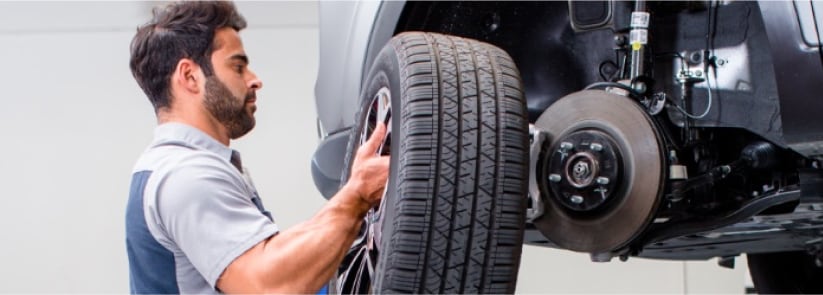
Understanding when to change your tires is important for ensuring a safe and smooth driving experience. Knowing what factors impact the lifespan of a tire helps in determining when the best time to replace them is. According to Bankrate, ??the average car weighs 4,094 pounds. The tires on a car are responsible for having enough grip to stop that 4,094 pounds regardless of the weather and environmental conditions. Therefore, the argument could be made that the tires are the most important safety feature of a vehicle. On average, tires should be replaced every 6 years, or after every 25,000 to 50,000 miles driven, as recommended by most tire manufacturers. Let’s look at the determining factors of why this is the recommendation.
Key Factors Influencing Tire Wear
- Driving Habits: Aggressive driving, such as fast acceleration, hard braking, and sharp turns, can significantly reduce the lifespan of your tires.
- Road Conditions: Rough, uneven, and debris-filled roads can lead to quicker tire wear.
- Climate: Extreme temperatures, both hot and cold, can affect the rubber compound of your tires, leading to faster deterioration.
- Tire Type: High-performance tires may offer better grip, but they can wear out faster than all-season tires.
- Vehicle Maintenance: Improper wheel alignment, unbalanced tires, and incorrect tire pressure can all contribute to uneven and accelerated tire wear.
Signs That Indicate Tire Replacement is Due
- Tread Depth: The most obvious indicator is the tread depth. A tread depth of 2/32 inches or less means it's time for new tires. The quarter test is a simple way to check this: Periodically test tread depth by inserting an upside-down quarter in the tire tread. If you can see the top of George Washington's head, the tire should be replaced.
- Visible Damage: Look for cuts, cracks, bulges, or punctures. These can compromise the tire's structure and potentially lead to a blowout.
- Vibration or Unusual Noise: Excessive vibration or noise while driving can indicate uneven tire wear or internal tire damage.
- Age of the Tires: Regardless of tread depth, replace tires that are 6-10 years old, as the rubber compounds deteriorate over time.
Why Regular Tire Replacement is Crucial
- Safety: Worn tires significantly reduce your vehicle's ability to grip the road, especially in adverse weather conditions, increasing the risk of accidents.
- Performance: New tires improve handling, steering, and braking, offering a smoother and more efficient driving experience.
- Fuel Efficiency: Worn tires can decrease fuel efficiency due to increased rolling resistance.
- Preventing Blowouts: Regularly replacing tires can prevent dangerous blowouts, which are more common with old or worn-out tires.
Tips for Extending Tire Life
- Regular Tire Rotation: This helps even out tire wear by changing their positions on the vehicle.
- Maintain Proper Tire Pressure: Check and adjust tire pressure monthly, as recommended in your vehicle's manual.
- Wheel Alignment and Balancing: Have your wheels aligned and balanced regularly to prevent uneven wear.
- Avoid Harsh Driving: Smooth, cautious driving extends tire life.
Tire maintenance and timely replacement are essential for the safety, performance, and efficiency of your vehicle. By being aware of the signs of tire wear and understanding the factors that affect tire longevity, you can make informed decisions about when to replace your tires. While tires might seem like a costly investment, they are fundamental to your vehicle's overall health and your safety on the road. Don't wait for a flat tire or a dangerous blowout - keep an eye on your tires and replace them when necessary. Bob King’s Professional Hyundai Tire Service is available for you so you can have peace of mind. Find tire tips and schedule your appointment at www.bobkinghyundai.com/hyundai-service/tires.htm.

